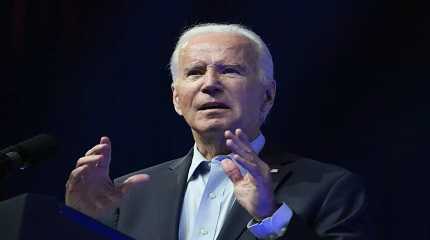
RIYADH, Saudi Arabia (AP) — President Joe Biden on Saturday spoke with Palestinian President Mahmoud Abbas and Israeli Prime Minister Benjamin Netanyahu, urging the leaders to allow humanitarian aid to the region and affirmed his support for efforts to protect civilians.
The weekend calls in Washington came ahead of Defense Secretary Lloyd Austin’s announcement that the U.S. was moving up a second carrier strike group in support of Israel. Secretary of State Antony Blinken intensified diplomatic outreach across the Middle East and beyond to rally an international response to prevent the Israel-Hamas war from expanding.
The broad U.S. efforts reflect the international concern about the number of civilians at risk and the potential ramifications of a prolonged war as Israel told Gaza residents to move south and Hamas urged people to remain in their homes. The Biden administration has not publicly urged Israel to restrain its response after the Hamas attack a week ago, but has emphasized the country’s commitment to following the rules of war.
Addressing a Human Rights Campaign dinner Saturday in Washington, Biden linked the humanitarian crisis in Gaza to different versions of hate that he said must be stopped.
“A week ago we saw hate manifest another way in the worst massacre of the Jewish people since the Holocaust,” Biden said, citing the 1,300 lives lost in Israel as well as “children, grandparents alike kidnapped, held hostage by Hamas.”
“The humanitarian crisis in Gaza — innocent Palestinian families and the vast majority that have nothing to do with Hamas — they’re being used as human shields,” he said. “We have to reject hate in every form.”
Blinken met with Saudi Arabian Foreign Minister Prince Faisal bin Farhan in Riyadh before stopping in the United Arab Emirates as he sought ways to help civilians trapped in between the fighting and to address the growing humanitarian crisis.
He also called his Chinese counterpart as Palestinians struggled to flee from areas of Gaza targeted by the Israeli military before an expected land offensive.
Austin as well on Saturday spoke with Israeli Minister of Defense Yoav Gallant, stressing the importance of safeguarding civilians. Austin offered updates on U.S. efforts to boost air defense capabilities and munitions for Israeli forces that he noted were aimed at stemming escalation of war, according to a readout of the call.
Austin said the Biden administration was sending the additional carrier strike group to the Eastern Mediterranean. The Eisenhower will join the USS Gerald R. Ford carrier strike group, which is already sailing near Israel, to bolster U.S. presence there with a host of destroyers, fighter aircraft and cruisers.
In a statement announcing the deployment, Austin said sending the second carrier was “part of our effort to deter hostile actions against Israel or any efforts toward widening this war following Hamas’s attack on Israel.”
While Biden has spoken to Netanyahu multiple times since the Hamas attack, Saturday’s call was his first to Abbas, who runs the Palestinian Authority which controls the West Bank. According to a readout of the call, Abbas briefed the president on efforts to bring aid to Palestinian people, particularly in Gaza.
Biden reiterated to Abbas that “Hamas does not stand for the Palestinian people’s right to dignity and self-determination,” according to the readout.
Biden spoke with Netanyahu to “reiterate unwavering U.S. support for Israel,” according to the readout. He briefed the Israeli leader on regional efforts to ensure civilian access to food, water and medical care.
The number of U.S. citizens killed rose to 29, U.S. officials said Satutday, and 15 were unaccounted for, as well as one lawful permanent resident.
Blinken, in his visits with Saudi and UAE leaders, also cited the need for humanitarian assistance and safe passage from those who wish to leave Gaza as he spoke to Arab audiences from their home turf, where his hosts put that issue at the top of their concerns.




